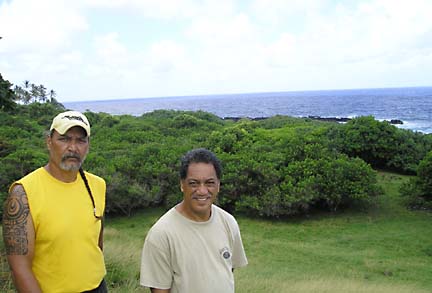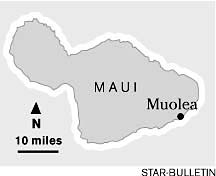

|
Heiau land hangs
in balance
Hawaiian advocates ask the
Maui Council to pony up $1 million
HANA, Maui >> Walking on a trail of flat stones between a seaside tangle of milo trees and high pasture grass, Anthony Pu points to remnants of a Hawaiian temple, or heiau, and signs of an underground stream that still flows beneath the ground in East Maui.
"This is part of our legacy," said Pu, a native Hawaiian whose ancestors lived here before the arrival of Western explorers in 1778.
 A number of native Hawaiians in Hana, including Pu, are working with the nonprofit group Trust for Public Lands in an attempt to purchase 73.2 acres of land at Muolea that includes the heiau.
A number of native Hawaiians in Hana, including Pu, are working with the nonprofit group Trust for Public Lands in an attempt to purchase 73.2 acres of land at Muolea that includes the heiau.
A public meeting is scheduled at 9 a.m. tomorrow before the Maui County Council's Budget and Finance Committee to determine whether the county should contribute $1 million toward the $4 million purchase from Hanahuli Associates Inc.
The federal government has offered to provide $2 million, and the trust the remaining $1 million through fund raising.
Trust project manager Joshua Stanbro said the trust has already raised about $700,000 and is looking for donations of $300,000.
Maui County Mayor Alan Arakawa has publicly supported the acquisition. Committee Chairman Riki Hokama said he was "very open" to considering the purchase, but there have been other requests for county acquisition of lands, including park space on Lanai, the east end of Molokai and also Ukumehame in West Maui.
Hokama said he wants to know Arakawa's land acquisition priorities.
The county has about $1.5 million designated for the purchase of open-space land, including parks.
Eric Kanakaole, an executive director of the nonprofit group Ho'onipaa No Hana Foundation, said buying Muolea is different from buying park land.
"It's totally different because we're trying to save our culture. We want to protect it for future generations," said Kanakaole.
Under the proposal, the county would own the land, located between Hana town and Kipahulu, but the nonprofit groups Ho'onipaa No Hana Foundation and Kipahulu Ohana would act as administrator, raising funds to restore the heiau and developing an education program, said Pu, another of the group's executive directors.
Pu said the group would continue to allow access to neighboring families who fish and gather food from coastal waters, and would establish an advisory board.
He said the main goal is to protect and restore Muolea, including remnants of the heiau and a summer residence once used by King Kalakaua until his death in 1891.
A main feature of the heiau appears to be its alignment with the mountains and sea, which seems to be connected with the rise each night of the Pleiades constellation.
Archaeologist Patrick Kirch said based on his brief reconnaissance, he believes there is a "substantial and significant archaeological complex" and that Muolea with its rich historical and cultural legacy should be preserved.
Pu said the group wants an archaeological inventory to be conducted of remnants of the heiau and other structures.
Two streams border the property, one containing native shrimp and goby fish, Pu said.
Besides hao and milo trees, the land contains coconut trees believed to be the only remaining stand introduced by the Polynesians.
Pu said the land is rich with oral history, such as the legend of the shark man who lived on a nearby bluff and was killed by residents and burned in a stone pit. The ashes were tossed into a tide pool, creating the "limu make," a deadly seaweed that would be smeared on the tips of spears by Hawaiian warriors, according to residents. (University of Hawaii scientist Paul Scheuer discovered the seaweed poison, naming it palytoxin.)
Pu said buying the 73 acres at Muolea was not only acquiring land, but also preserving the native Hawaiian history and culture of Maui.
"It's associated with legends." Pu said. "For us, our legend is our culture."
www.co.maui.hi.us